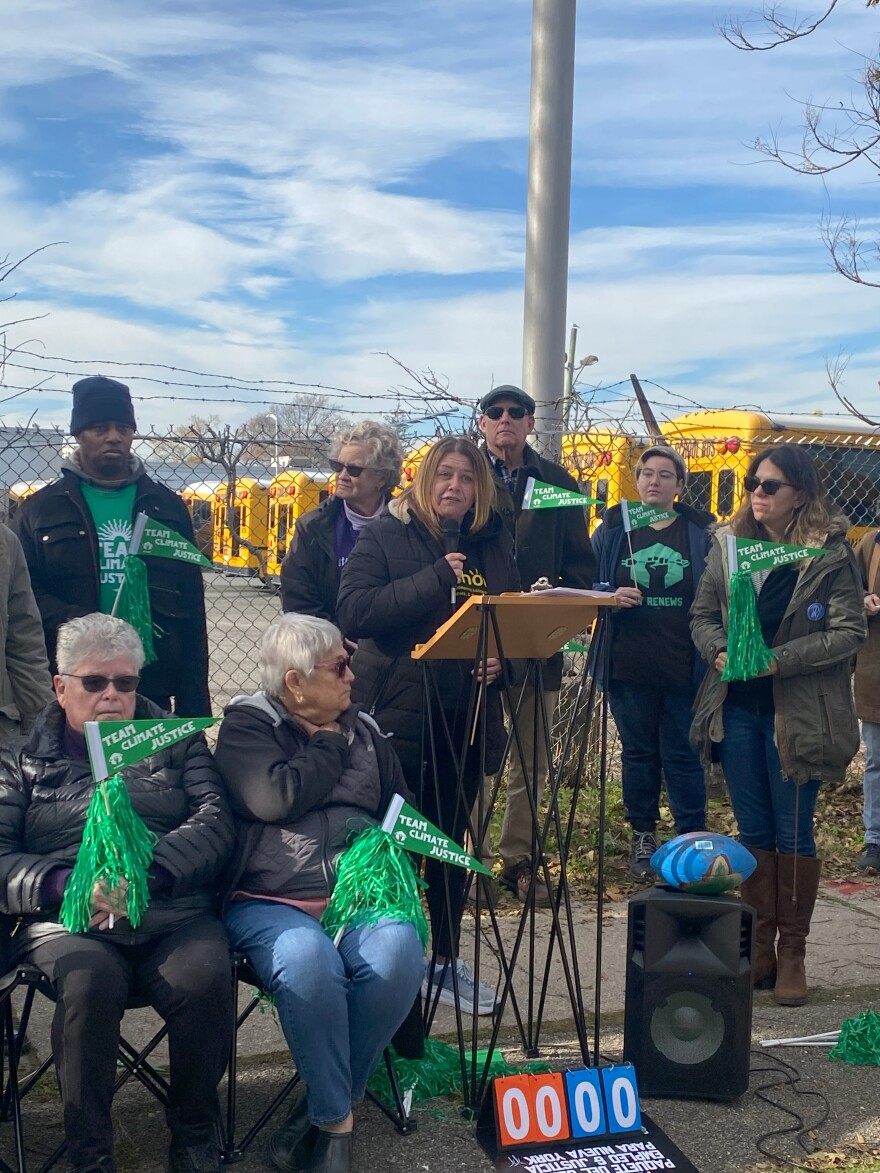Monique Fitzgerald has witnessed climate injustice occurring in her North Bellport neighborhood.
The fenceline community borders the Brookhaven Landfill and other industrial pollutants that contribute to North Bellport having the lowest health outcomes in Suffolk County. She combats environmental justice and high energy costs as a climate justice organizer with the Long Island Progressive Coalition.
“Living in a place that is identified as disadvantaged, living next to a landfill, I understand how the methane gas contributes to the climate crisis that we’re in,” Fitzgerald said.
North Bellport and more than 1,700 other neighborhoods in the rest of New York were identified earlier this year as disadvantaged communities earmarked for billions of dollars in climate funding, according to a state working group.
Now, several Long Island coalitions and organizations are calling for that money to be rolled out. They gathered on Wednesday, Nov. 15 in Hempstead — another disadvantaged community — to launch their campaign for the Climate, Jobs & Justice Package. The bill package features three pieces of climate legislation and a spending budget proposal that they hope will act as a legislative roadmap for Gov. Kathy Hochul to follow when she proposes her executive budget in the new year.

While they hoped to catch her attention using her beloved Buffalo Bills football — calling it #TeamClimateJustice vs. #TeamFossilFuels — their seriousness of the issues was anything but cheeky.
“We have a woman who’s home in reentry, who was incarcerated for over three years, finally got custody of her children back and had to choose between paying her electric bill or buying groceries,” said Caroline Hansen, lead organizer for New Hour for Women and Children Long Island. “That’s just not right.”
New York’s landmark 2019 Climate and Community Protection Act set an ambitious goal to reduce 40% of emissions by 2030. However, despite large renewable energy and offshore wind projects on the horizon, the state might not be on track to meet that mandate without smaller community-led projects in the pipeline for funding.
With Hochul expected to release her budget proposal at the beginning of 2024, climate activists want her to center an environmental justice plan for New York.
In response to the proposed package, a spokesperson for the governor’s office said Hochul “is committed to reducing emissions and fighting climate change, and will review all budget requests.”
The bill package includes a People’s Climate Justice Budget — a $1 billion spending plan that outlines critical climate and environmental justice plans for New York to fund in 2024.
The budget focuses on allocating money towards disadvantaged communities on Long Island — in accordance with state law which requires 35% of climate funding to go to disadvantaged communities — including $75 million for electric school buses and accompanying infrastructure.
There are 85 communities on Long Island that are considered disadvantaged. Many of the communities are similar to North Bellport, which is mostly Black and Hispanic residential with stretches of industrial warehouses, transportation and storage facilities that have contributed to high rates of asthma and other respiratory problems.
“In 1989, diesel exhaust was listed as a probable human carcinogen,” said Pamela Ginex from New York’s Poor People’s Campaign. “We also know that children, whose lungs are still developing, are particularly vulnerable to these health effects.”

Another focus outlined in the budget proposal is grant funding for community-led solutions. The grant would provide technical support, development of best practices for community planning and public engagement to improve opportunities and identify plans. However, unlike previous initiatives, the project is intended to be facilitated by nonprofits and community organizations, instead of local government.
“Let us stand united, recognizing that by passing this package and budget, we fortify Long Island's resilience, empower our communities, and pave the way for a sustainable and just future for all based organization grantees,” State Assemblymember Michaelle Solages (D-Elmont) said in a statement.
The three bills were approved in the state Senate last year, but failed to pass in the Assembly.
Ryan Madden, sustainability organizer at Long Island Progressive Coalition, blames the state budget process finishing late last year and lobbying from the fossil fuel industry who opposed climate funding bills.
However, Madden maintains that passing the package will shift the responsibility away from taxpayers when it comes to paying for climate projects.
“The Climate Change Superfund Act will actually raise $3 billion from the biggest oil polluters to pay for what would otherwise be borne on the taxpayer,” Madden said. “With the New York HEAT Act, similarly, we are aligning really important public service law with our Climate Act, which would lead to on average $75 a month in savings for people.”
There’s support in the Senate for the package, but Madden said they’re turning their attention to Assembly Speaker Carl Heastie to get his chamber’s support.
Climate activists are planning for additional listening sessions in Hempstead and other disadvantaged communities this upcoming year.
“I believe that my school district will be able to transition over to electric buses. I believe that my hometown of Bellport will get these investments so we can plan how we transition our energy source to community solar and make sure people are able to stay in their homes and pay their electric bills,” Fitzgerald said.
This story has been updated to make clear that the New York HEAT Act would be available to all low and moderate income households who pay utility bills.


